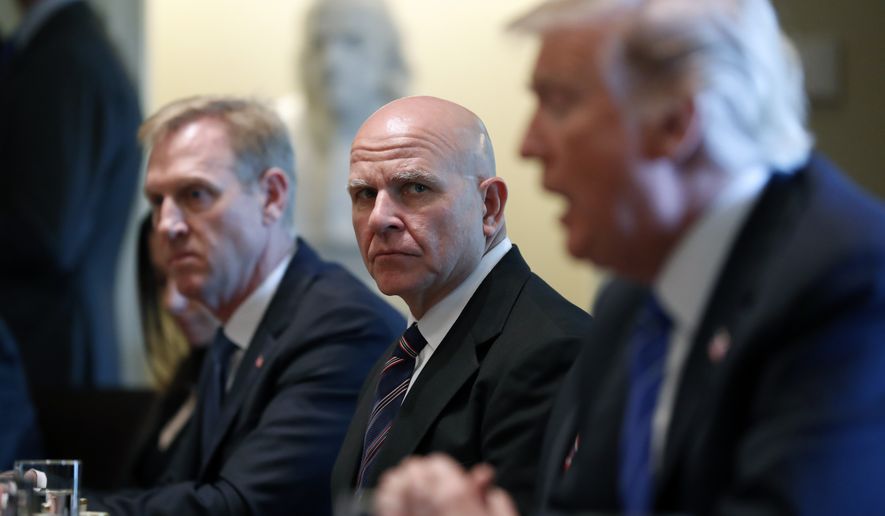The U.S. and its allies in the Pacific must steel themselves for the realistic possibility of open warfare with North Korea, National Security Adviser Lt. Gen. H.R. McMaster said Monday, hours after the country’s top diplomat claimed the growing war of words between the White House and Pyongyang was tantamount to a declaration of war.
Speaking at a national security symposium in Washington sponsored by the Institute for the Study of War, Gen. McMaster laid bare the dire situation the Trump administration has now found itself in regarding the threat posed by North Korea. “What we hope to do is avoid war, but we cannot completely discount that possibility,” he told attendees.
Top defense and national security advisers have been preparing a slew of possible diplomatic and military options to address Pyongyang’s growing aggressiveness against the U.S. and its allies in the Pacific, Gen. McMaster said. “We have thought through four or five ways to resolve this, and some [options] are uglier than others,” he said, adding “that thinking is evolving all the time.”
The three-star Army general’s comments came hours after North Korean Foreign Minister Ri Yong-Ho told reporters that Mr. Trump’s comments that the country “wouldn’t be around much longer” if it continued to threaten the U.S. was akin to a declaration of war. “At last, he declared a war on our country,” Mr. Ri told reporters in New York City.
“Even the fact that this comes from someone who is currently holding the seat of the United States presidency, this is clearly a declaration of war,” he added, noting that Pyongyang was now prepared to shoot down American aircraft operating near North Korean airspace in and around the peninsula. On Saturday, U.S. Air Force B-1B Lancer bombers from Guam, along with U.S. Air Force F-15C Eagle fighter escorts from Okinawa, Japan, flew in international airspace over waters east of North Korea.
“This is the farthest north of the Demilitarized Zone (DMZ) any U.S. fighter or bomber aircraft have flown off North Korea’s coast in the 21st century, underscoring the seriousness with which we take DPRK’s reckless behavior,” Pentagon Press Secretary Dana White said in a statement.
On Monday White House press secretary characterized Pyongyang’s claims over Mr. Trump’s comments claims as “absurd,” adding it would “never be appropriate” for a foreign military to fire upon U.S. warplanes operating over international waters.
Aside from vowing to down American aircraft skirting North Korean airspace, Pyongyang has also threatened to launch missile test shots at U.S. military installations in Guam and conduct a hydrogen bomb test in the Pacific. On Monday, Defense Secretary James Mattis said such a test by the North “would be a shocking display of irresponsibility toward global health, toward stability [and] toward non-proliferation.” However, he stopped short of characterizing such an action would be a clear act of war during a press briefing en route to a diplomatic visit to India.
Administration critics claim Mr. Trump’s virulent rhetoric against the North Korean regime, particularly the personal insults leveled against Kin Jong Un, have limited U.S. diplomatic options and pushed the country closer to war. Gen. McMaster dismissed those claims, saying the tone and tenor of Mr. Trump’s comments are in line with those of previous administrations.
“I do not think we have seen any evidence” of Mr. Trump’s rhetoric driving Pyongyang closer or further from war with the U.S.,” Gen. McMaster said. “But I do not think there is any lack of clarity now” over what the North faces, should it continue its provocative actions in the region, he added.
• Dave Boyer contributed to this report
• Carlo Muñoz can be reached at cmunoz@washingtontimes.com.




Please read our comment policy before commenting.